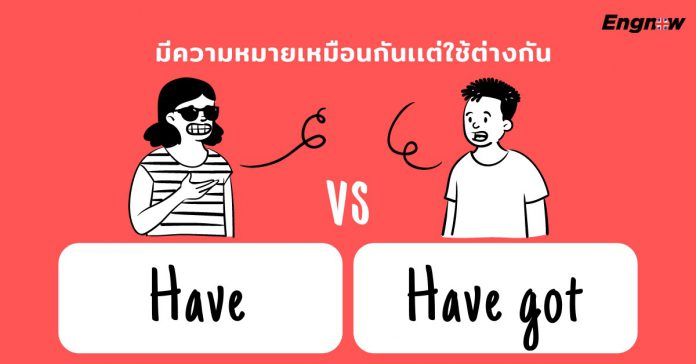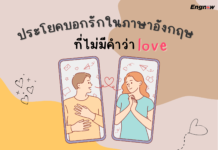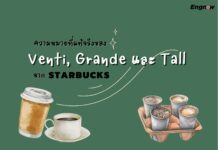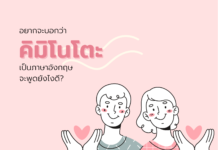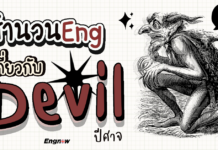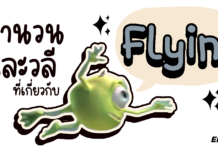Have และ have got แปลว่ามีหรือได้รับบางสิ่งบางอย่าง (= เพื่อการแสดงความเป็นเจ้าของ ความสัมพันธ์
หรือความเจ็บป่วยฯลฯ)
คุณสามารถใช้ have หรือ have got ก็ได้เพราะจริงๆแล้วมันไม่มีความแตกต่างกันในเชิงของความหมาย
ทีนี้เรามาลองดูตัวอย่างกัน
- They have a new car. or They’ve got a new car. พวกเขามีรถใหม่
- Lisa has two brothers. or Lisa’s got two brothers. ลิซ่ามีพี่ชายสองคน
- I have a headache. or I’ve got a headache. ฉันปวดหัว.
- Our house has a small garden. or Our house has got a small garden. บ้านของเรามีสวนเล็ก ๆ
- He has a few problems. or He’s got a few problems. เขามีปัญหาเล็กน้อย
.
.
.
ด้วยความหมายเหล่านี้ เราจะไม่ใช้รูปแบบ continuous ได้
- We’re enjoying our holiday. We have / We’ve got a nice room in the hotel.
เรากำลังสนุกกับวันหยุดของเรา เรามีห้องพักที่สวยงามในโรงแรม (ไม่ใช่ We’re having a nice room)
ในอดีตที่เราใช้ had (แต่ไม่มี got)
- Lisa had long hair when she was a child. (not Lisa had got)
ลิซ่าไว้ผมยาวตอนเด็ก ๆ (ไม่ใช่ Lisa had got)
.
.
ในคำถามและประโยคปฏิเสธนั้น have กับ have got มีสามรูปแบบที่เป็นไปได้:
Do you have any questions? Don’t have any questions.
Have you got any questions? I haven’t got any questions.
Have you any questions? (ไม่ค่อยทางการ) I haven’t any questions. (ไม่ค่อยทางการ)
Does she have a car? She doesn’t have a car.
Has she got a car? She hasn’t got a car.
Has she a car? (ไม่ค่อยทางการ) She hasn’t a car. (ไม่ค่อยทางการ)
.
.
ในรูปประโยคที่เป็นประโยคคำถามและประโยคปฏิเสธในรูปอดีต เราจะใช้ did หรือ didn’t
- Did you have a car when you were living in Paris?
คุณมีรถไหมตอนที่คุณอาศัยอยู่ที่ปารีส - I didn’t have my phone, so I couldn’t call you.
ฉันไม่มีโทรศัพท์เลยโทรหาคุณไม่ได้ - Lisa had long hair, didn’t she?
ลิซ่ามีผมยาวไม่ใช่หรอ
.
.
Have breakfast, have a shower, have a good time etc.
นอกจากนี้เรายังใช้ have (แต่ไม่ใช้ have got) สำหรับการกระทำและประสบการณ์ ตัวอย่างเช่น:
| breakfast/ dinner/ a cup of coffee/ something to eat etc. | |
| a bat/ a shower/ a swim/ a break / a rest / a party /a holiday | |
| an accident /an experience /a dream | |
| Have | a Look (at something) |
| a chat / a conversation /a discussion (with somebody) | |
| trouble / difficulty / fun / a good time et c. | |
| a baby (= give birth to a baby) |
คุณสามารถใช้รูป continuous (am having ) กับการกระทำหรือการแสดงออกในตารางข้างบน:
- We’re enjoying our holiday. We’re having a great time.
เรากำลังสนุกกับวันหยุดของเรา เรามีช่วงเวลาที่ดี (ไม่ใช่ We have)
- Mark is having a shower at the moment. He has a shower every day.
มาร์คกำลังอาบน้ำอยู่ในขณะนี้ เขาอาบน้ำทุกวัน
.
.
ในคำถามและประโยคปฏิเสธเราใช้ do / does / did:
- I don’t usually have a big breakfast. (not I usually haven’t)
ฉันมักจะไม่ทานอาหารมื้อเช้า (ไม่ใช่ I usually haven’t)
- What time does Chris have lunch? (not has Chris lunch)
คริสทานอาหารกลางวันกี่โมงหรอ (ไม่ใช่ has Chris lunch)
- Did you have trouble finding a place to live?
คุณมีปัญหาในการหาที่อยู่อาศัยหรือป่าว


